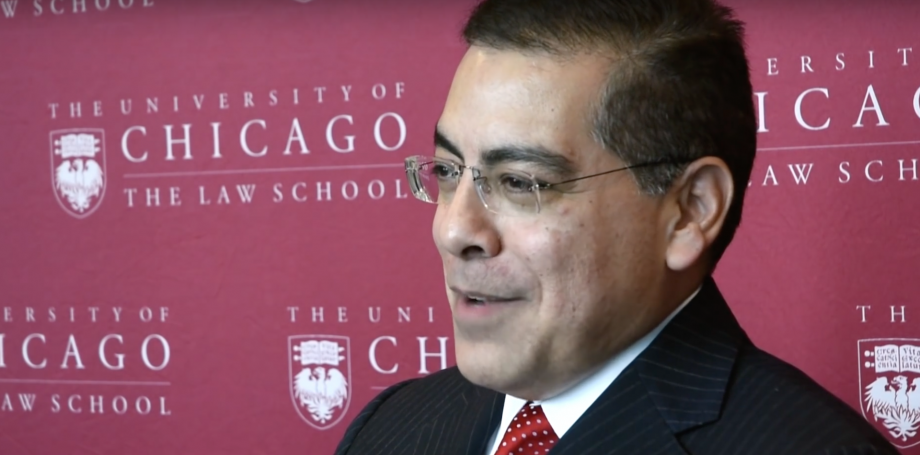My Chicago Law Moment: Jesse Ruiz, '95, on How Obama's Class Helped Him Protect Immigrants

It was 2006, and Chicago lawyer Jesse Ruiz, ’95, then the chairman of the Illinois State Board of Education, had a problem to solve. Fortunately, Barack Obama had given him the answer 12 years earlier, when Ruiz was Obama’s student at the Law School.
It was a quintessential Chicago Law Moment: a high-profile crisis stemming from a hot-button political issue, resolved under the leadership of an alumnus who looked to his Law School experience for guidance and ultimately helped codify the solution in Illinois law. And it’s a Moment that might never have happened.
Ruiz hadn’t initially set out to take Obama’s class, Current Issues in Racism in the Law. But the future president, who taught at the Law School between 1992 and 2004, had advised Ruiz during a summer job search and the two had developed a friendly rapport. So when Obama suggested that Ruiz take the seminar he’d designed, Ruiz figured, Well, why not?
“He wasn’t as widely known as he is today, so he had to recruit for students to take his course,” Ruiz said with a smile.
Fortunately, the class turned out turned out to be a winner: “It really forced us to think,” Ruiz said. It also introduced Ruiz to Plyler v. Doe, a 1982 Supreme Court ruling that gives all children a right to a public education regardless of their immigration status.
Fast forward a dozen years, and ISBE Chairman Ruiz found himself thinking of Plyler after an Elmwood Park school district refused to enroll an Ecuadorian teen who had only a tourist visa.
“I said, ‘Time out. I studied this. I know for a fact that there’s a Supreme Court case that says you can’t do that,’” Ruiz said. The ISBE voted to cut off the school’s state funding, a move that could have barred the district’s athletes from competing in an upcoming basketball tournament.
The tense, 24-hour standoff garnered media attention, but in the end the district backed down, and the state board held a news conference to announce that their funding had been restored.
That’s when Ruiz called on another Law School professor: Susan Gzesh, an immigration lawyer who’d taught an immigration class that Ruiz had taken his second year. Gzesh, who is now the executive director of the University of Chicago’s Pozen Family Center for Human Rights, agreed to join Ruiz at the news conference.
“She dropped everything and came and was able to address a few questions that some of the reporters had on a specific issues of immigration law and the specific application of Plyler v. Doe,” Ruiz said. “I had the education that Barack Obama had given me a number of years beforehand, but I also had my immigration professor standing right next to me, supporting me in my service efforts to do the right thing by Illinois students.”
Looking back, Ruiz is proud that the experience helped so many Illinois students—and proud of the ways in which the Law School prepared him to navigate it.
“Since then we’ve created regulations … Plyler is codified in Illinois law,” he said. “I knew [the Law School] was a special place that was going to teach [me] to think like a lawyer. It’s a bit cliché to say, but they did challenge me in how I approach problems and try to find solutions to problems, and it gave me great analytical skills. But it also gave me a real world view—you’ve got these tools, so now what do you do with them?”
My Chicago Law Moment is a series highlighting the Law School ideas, experiences, and approaches that have impacted our students and alumni. Video produced by Will Anderson.